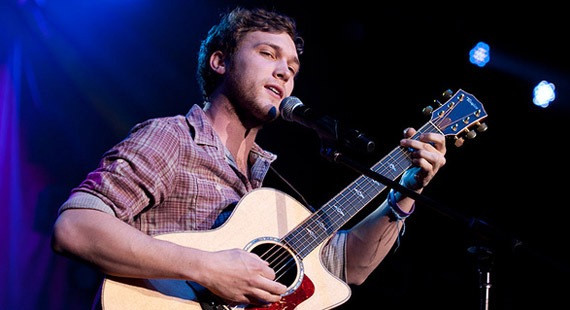How Much Money Do American Idol Contestants Make?

American Idol is basically the granddaddy of all the competitive reality shows we see today. Around since 2002, in it’s twelve year run it’s played host to any number of judges—from the understandable (Jennifer Lopez, Mariah Carey) to the slightly less so (Ryan Seacrest, anyone?), it’s spawned hundreds of copycats but remains the dominating monarch of reality singing shows. The basic premise is simple—hundreds of thousands of “normal” people audition in front of celebrity judges, who choose either to propel them to stardom or brutally crush their dreams in front of an audience of millions. Whether or not you watch it for the cringe-worthy auditions where sparky hopefuls get ripped to tiny shreds after belting out an a cappella Mariah Carey number with no discernible notes or you follow it right the way through to the end, American Idol is a pop culture phenomenon.
And when you create a show this huge (thanks, Simon Cowell), you’re bound to start making at least some spare change out of it. And, with contestants performing in the bombastic and infamous live shows, a few people have been asking: if the judges can be paid millions of dollars per series, what do these innocent hopefuls actually get paid for their appearances on American Idol?
As you would imagine, contestants get their expenses covered all the way throughout the show (although apparently residences have varied, from “Hollywood-style mansions” to simple apartment complexes that are avoided on television), but that’s not to say they don’t make some money from the endeavor as well. You’d usually have to hang around till at the least the top twelve before you started looking at any real cash, though. At that point, contestants are required to join AFTRA (The American Federation of Television and Radio Artists). Though it might sound like a slightly more glitzy version of your office union, AFTRA requires those appearing on television to be paid a specific minimum wage and—brace yourself—the minimum amount they can be paid is reportedly $921 per hour. Put it this way: a special three-hour show plus various backstage and during-week recordings will add up to enough to buy half the tickets for the American Idol live tour (probably).
Which brings me on to my next point. Performers also take part in the live tour over the summer, which stops of at around fifty locations during its run. Per performance, contestants are rumored to receive somewhere in the realm of $1,000, with winners receiving even more than that. They are also put up in the finest accommodation while they travel, as well as receiving $50 spending money on non-show days. Beats playing out supporting gigs in dingy basements.
Of course, it’s a given that the winners get a big chunk of money when they triumph too. TMZ leaked a contract relating to these winnings. Aside from a $350,000 prize, winners receive a record deal worth several hundreds of thousands of dollars—a number which increases with every subsequent record that they release. And this isn’t just limited to the winners—no, even contestants who make it to the top ten or twelve can be offered record deals and drafted on to singles too—with the lowest advance for four singles being $24,000.
And that’s not even touching upon the money they can make from personal appearances. With countless fans desperate to meet and greet their favorite singer, there’s a business in just turning up and belting out a quick number for a private audience, and it’s believed Philip Philips made somewhere in the realm of $200,000 working for Disney. Idols also receive money for performing in commercials while on the show (usually for Disney and Ford), and it’s estimated that the top four make about one million dollars from their year on American Idol.
Currently, the most successful Idol alumnus is (predictably) Carrie Underwood—sailing to victory in season four, Forbes pegged her worth at an estimated $31 million, made from a music career and a number of related appearances and contracts. Other stars have exploited their fame with spots on I’m a Celebrity (Sanjaya), Broadway (Clay Aiken, to name but one), and autobiographies detailing their rise to fame, almost all of which have the word “sing” in the title (pretty much everyone).
In fact, the only people who end up with the really bum end of the deal are the contestant’s families, as the show does not cover travel expenses or accommodation for them to visit their loved one or watch them perform. But how on earth would they manage to get in all those shots of sobbing family members brimming over with pride if they won’t even turn up?
